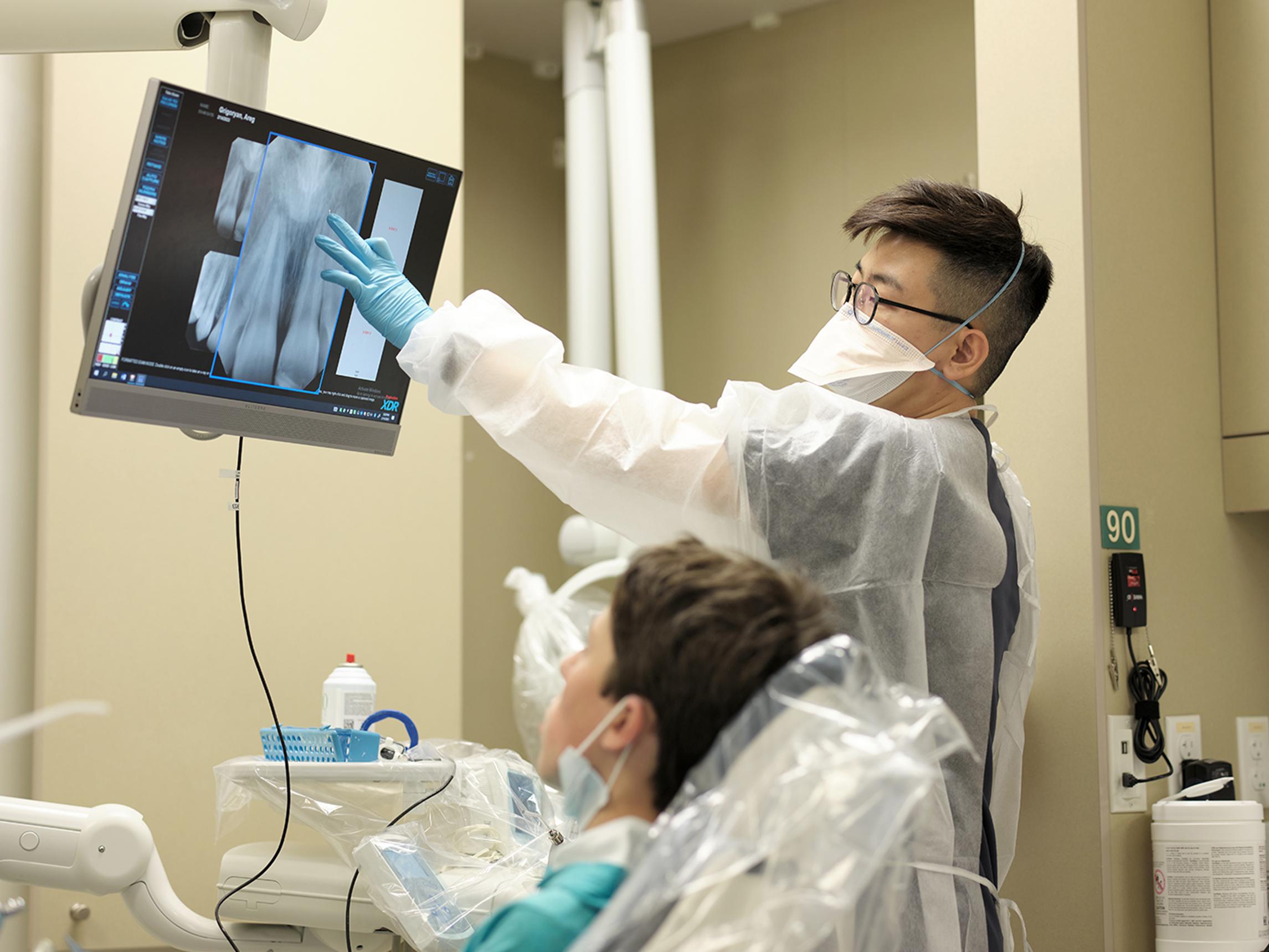An Overview to Typical Dental Conditions That Need a Dentist's Treatment
Toothaches, for instance, can be symptomatic of serious issues such as cavities, cracked teeth, or abscesses, each calling for details treatments like fillings or origin canals. Affected wisdom teeth and jaw problems can present considerable discomfort and problems.
Toothaches
Toothaches are a typical oral condition that can vary from light pain to serious discomfort, often indicating an underlying concern that requires professional attention. This pain can originate from a selection of sources, including dental tooth cavities, split or fractured teeth, and oral abscesses. Each of these conditions poses substantial risks if left neglected, possibly bring about a lot more serious problems.
Tooth decays, likewise understood as cavities, are brought on by the accumulation of plaque that erodes tooth enamel, leading to holes or pits in the influenced teeth (dentist eugene or). Split or fractured teeth, on the various other hand, might result from injury, grinding, or attacking into tough objects. These structural damages can expose the delicate inner layers of the tooth, creating sharp discomfort and raising the threat of infection. Abscesses hurt infections at the origin of a tooth or in between the periodontal and a tooth, commonly resulting from severe decay or neglected dental caries.
Efficient therapy of toothaches includes resolving the root reason. This may consist of fillings for cavities, crowns for split teeth, or root canals and prescription antibiotics for abscesses. Early intervention by a dental expert can prevent more degeneration and alleviate discomfort, ensuring ideal oral wellness.
Gum Condition
Periodontal condition, a prevalent yet usually ignored oral condition, shows up with swelling and infection of the periodontals and supporting tissues. This condition largely happens in two stages: gingivitis and periodontitis. Gingivitis, the milder type, presents with symptoms such as red, inflamed gums that may bleed conveniently during cleaning or flossing. If left neglected, gingivitis can proceed to periodontitis, an extra extreme form defined by the damage of the supporting bone and connective tissue, inevitably causing tooth loss.
The key root cause of gum tissue disease is bacterial plaque, a sticky, colorless movie that continuously bases on teeth. Poor dental health, smoking cigarettes, hereditary proneness, and particular clinical problems, such as diabetes, can intensify the risk of developing periodontal illness. Routine dental exams are vital for very early discovery and administration of this condition.
Treatment for gum disease varies from specialist dental cleaning and scaling to more sophisticated procedures like origin planing and periodontal surgical treatment, depending upon the seriousness. Maintaining great dental hygiene techniques, consisting of brushing two times daily, flossing, and using an antiseptic mouth wash, can considerably decrease the danger of gum condition and promote healthier gum tissues.
Tooth Cavities
Dental caries, also referred to as cavities, are an usual dental problem defined by the devastation of tooth enamel because of acid-producing bacteria in the mouth. These microorganisms grow on sugars and starches from food and drinks, producing acids that progressively erode the enamel, resulting in cavity development.
Early-stage cavities might disappoint symptoms, however as they proceed, they can trigger toothache, level of sensitivity to chilly or hot, visible openings or pits in the teeth, and discoloration. If left unattended, dental caries can penetrate deeper layers of the tooth, possibly resulting in serious discomfort, infection, and even tooth loss.
Preventing tooth cavities entails a combination of great dental health methods and dietary practices. Normal brushing with fluoride toothpaste, flossing, and regular dental exams are vital. Dentists might also suggest extra safety nets, such as fluoride treatments and dental sealants, to safeguard teeth from degeneration.
Small tooth cavities can be attended to with dental fillings, which recover the tooth's framework. A lot more innovative instances might need crowns or also origin canal treatment if the degeneration has gotten to the tooth's pulp.

Impacted Wisdom Teeth
Influenced wisdom teeth are a common dental concern that occurs when the third molars, commonly described as knowledge teeth, fail to fully emerge or line up effectively within the mouth. This condition usually arises from insufficient space in the jaw or an irregular development angle of the teeth. Affected wisdom teeth can result in a range of complications, including pain, damage, and infection to nearby teeth.
When knowledge teeth end up being impacted, they are often partially emerged or continue to be entirely below the gum tissue line. This partial eruption can develop a pathway for germs to go into the periodontals, resulting in infections that show up as swelling, pain, and even fever. Furthermore, influenced knowledge teeth can apply stress on bordering teeth, possibly creating crowding or changing.
A thorough oral examination, usually including X-rays, is vital for identifying affected Click Here wisdom teeth. Treatment often entails medical removal, done by a dental surgeon. The treatment aims to relieve pain and protect against more difficulties, such as cysts or damage to bordering bone structures. Post-operative treatment is vital to guarantee proper healing and decrease the danger of infection. Regular dental exams are advisable to keep track of the condition and preserve oral health and wellness.
Jaw Disorders
Jaw conditions, jointly understood as temporomandibular joint (TMJ) problems, incorporate a range of problems that affect the jaw joint and bordering muscle mass. These conditions can materialize with signs and symptoms such as pain or inflammation in the jaw, difficulty eating, a popping or clicking noise when closing the mouth or opening, and also chronic migraines. TMJ conditions can emerge from various variables, including arthritis, jaw injury, or habitual habits like teeth grinding or jaw clenching.
Medical diagnosis of TMJ disorders commonly includes a thorough assessment by a dentist, consisting of a physical exam of the jaw, oral X-rays, and in some cases advanced imaging techniques like MRI or CT scans to assess their website the joint's problem. Treatment options differ depending on the extent of the condition. Non-invasive techniques such as physical treatment, oral splints, and medications aimed at decreasing inflammation and discomfort are usually first-line treatments. In more extreme situations, medical interventions may be needed to deal with architectural problems within the joint.
Very early treatment by a dental specialist is crucial to stop the progression of TMJ problems and to keep total oral health. Patients experiencing persistent jaw pain or disorder must seek punctual assessment and treatment.
Verdict
Preserving oral health and wellness requires timely specialist like attend to typical oral conditions. Toothaches frequently indicate underlying issues such as dental caries, broken teeth, or abscesses, requiring punctual treatment. Gum condition, from gingivitis to the original source periodontitis, demands regular oral exams and cleanings to avoid development. Affected wisdom teeth and jaw conditions also need expert interest to ease discomfort and stop more issues. Normal oral check outs are essential for detecting and dealing with these problems, ensuring total dental wellness and well-being.
Dental cavities, likewise known as cavities, are caused by the buildup of plaque that erodes tooth enamel, leading to holes or pits in the affected teeth. Abscesses are unpleasant infections at the origin of a tooth or in between the gum tissue and a tooth, commonly resulting from severe decay or neglected dental caries.

Additionally, influenced wisdom teeth can apply pressure on neighboring teeth, potentially causing crowding or shifting.
Comments on “Your Overview to Selecting the Right Dentist Eugene OR for Quality Solution”